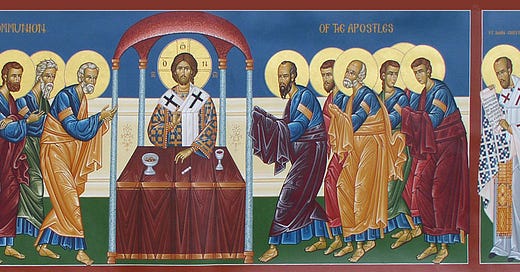The Eucharist According to the Scriptures and the Early Church Fathers
What is communion and why do we commune?
The Eucharist is a Holy Mystery. It is what differentiates Christianity from every other religion, pagan cult, and secular gathering. Within it is contained the mystery of life and the economy of salvation. It is the body and blood of Christ—a partaking of the very sacrifice offered on the cross—which is the medicine of immortality (Saint Ignatius, d. 108 A.D.),1 and the food of salvation (Saint Cyprian, d. 258 A.D.).2 When we commune in remembrance of Christ (Luke 22:19; 1 Corinthians 11:24) our remembrance is one of actual participation (anamnesis) in His body and blood and sacrifice on the cross, not mere reminiscence (mneia).3 The carnal man cannot survive without food, neither can the spiritual man live without this Bread of God (Saint Ignatius),4 which is not like common bread and drink (Justin Martyr, d. 165 A.D.).5 While earthly food is transformed into our bodies, resulting in temporary survival, the heavenly food transforms us into Christ’s body.6 In this very real sense, participation in the Eucharist is how we abide in Christ (John 6:56; John 15), how we become partakers of the divine nature (1 Peter 1:4; St. Cyril, d. 386),7 and what constitutes unity among Christians as the body of Christ (1 Corinthians 10:17).
The Eucharist is, without question, the centerpiece of Christian life. Only recently has Christ’s Eucharistic institution been dethroned from its primary place in Christian worship. Historically, such an act would be akin to voluntary condemnation and spiritual death (St. Ignatius).8 We have it backwards. The problem with Adam was that he ate; the problem with modern man is that he does not. Christian communities without the Eucharist, regardless of their nature, are merely moral subsets of secular society which have distorted sacred scripture, ignored Paul’s exhortation to stand fast in Holy Tradition (2 Thessalonians 2:15), and have been taken captive by the traditions of men (Colossians 2:8). Christianity without the Eucharist is an implicit rejection of the incarnation, an eviction notice from the physical world to God, and structured on moralism. Christianity, however, is about participation in the life of Christ, not do’s and don’ts or rational assent to dogmatic propositions. His Eminence Metropolitan Kallistos asks,
What is the fundamental ‘action of the church’? It is surely the celebration of the Eucharist, the divine liturgy. At the last supper, Christ instructed his apostles not say this, but do this. He gave them an action, not just words.9
We are told that, if you do not eat of the Lord’s body and blood, you have no life in you (John 6:53). What does all of this mean for the modern Christian who does not understand the Eucharist in this manner? Ultimately, the Eucharist is a mystery. Just like the Virgin Birth, Incarnation, and the Holy Trinity, it supersedes all human reasoning and rationale.
Taste and see that the Lord is good (Psalm 34:8).
Ignatius, Epistle to the Ephesians. Chapter 20.
St. Cyprian on the Lord’s Prayer (Nn. 18, 22; CSEL. 3, 280-281; 283-284)
See Fr. Andrew Stephen Damick, An Introduction to God. Page 91. Which reads: “In both of these passages [Luke 22:19; 1 Corinthians 11:24], the word for remembrance is not the Greek word meaning “recall,” which is mneia. Rather, the word used there is anamnesis, which means “to make present by means of memory.” Anamnesis is invocation—by doing this act, the Church is invoking the very presence of that which it remembers, making truly present at this moment something from the past.”
St. Ignatius, Epistle to the Ephesians. Chapter 5. Also see John 6:33.
St. Justin Martyr, First Apology. Chapter 66.
See Christophorus Stravroupolos, Partakers of the Divine Nature. Also see John 6:58.
St. Cyril of Jerusalem. Catechetical Lectures. Mystagogic 4, 22, 3.
St. Ignatius, Epistle to the Smyrnaeans. Chapter 7
Pope and Patriarch in Rome: Future Opportunities –Lecture by Metropolitan Kallistos Ware http://www.ancientfaith.com/specials/lectures_by_metropolitan_kallistos_ware





I recently attended Liturgy in another parish because I traveled. It was one of the worst feelings when the faithful were called to partake in the Eucharist and the only ones that approached to commune were three children and I. As I learned the parishioners are taught that you must fast strictly and confess before you commune and they do it only a few times a year... It makes you think what is the purpose of Liturgy without Communion. We should always be properly prepared (to the best of our ability) before communing but keeping people away from Christ is not the way.